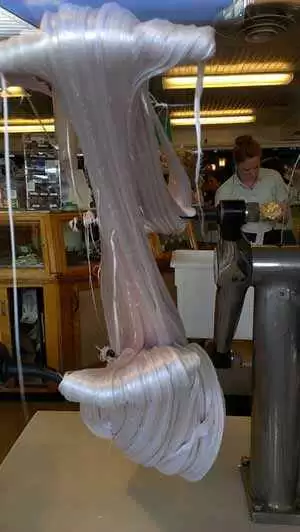
Celiac.com 05/27/2010 - People don't generally think that the food they feed their pets not only affects their pets, but also impacts their lives as well. Going gluten-free in my house also meant going gluten-free for my pets. Your pets can't tell you if something is wrong. Just like my doctors had no idea that my problems were related to gluten, my veterinarian certainly would never suggest that my dog is gluten-intolerant! It is up to us as pet owners to realize that reoccurring health problems in our pets, could be an indication of food intolerance's.
Deciding to put my pets on a gluten-free diet was not a hard decision to make. My two year old lab/mix, Maya was constantly getting eye infections, which my vet disregarded as environmental allergies. The problem was she had allergies year round and was getting eye infections once a month-which we treated with antibiotics, and benadryl. My vet did not recommend dietary changes for my dog, but I took charge and decided to try a gluten-free diet anyway.
Celiac.com Sponsor (A12):
Since putting Maya on a gluten-free diet, she has not had a single eye infection. She still has mild seasonal allergies, but nothing like she had when she was eating gluten-based dog food. Through my research I found that the first ingredient in dog and cat food should be meat-which makes sense since they are carnivores. However, most pet food I found (including my previous “grain-free”pet food) listed the first ingredients as a grain; either oats, wheat, barley or rice.
I recently had my cat tested for parasites. The results were that he had parasites from grain based foods. The vet told me that the parasites were harmless, but as long as I fed my cat grain-based foods, he would continue to test positive for intestinal mites. I switched his food to gluten-free immediately following his vet visit. Since switching to a gluten-free/grain-free food for my pets, I have seen a huge improvement in all my pets overall health an well-being.
Aside from the obvious health benefits for my pets, gluten-free food is also better for you. Now that my pets are all eating gluten-free diets, I no longer have to worry so much about possible cross-contamination from touching their food. I can now get slobbery kisses from my dogs worry free. I also no longer worry about washing my dog and cats food dishes in the same sink or with the same sponge as I use for my other dishes.
Research is the most important thing to do when looking for a gluten-free pet food. There are quite a few grain-free options on the market, but be careful, 'grain-free' does not necessarily mean 'gluten-free'; contacting the manufacturer can help to dispel any concerns. Most commercial pet stores do not carry gluten-free pet food options. I found more gluten-free options at the mom and pop pet store I usually frequent. I did a lot of Internet research and talked to my local pet store endlessly to find the right product for my pets. However, you may need to special order your pet food through your pet store, or online. It is also important to introduce new foods to your pets gradually. It is always advised to mix your old food with the new food when first introduced. Ask your veterinarian what the best practice is for introducing new foods to your pets.
It is also important to find out about product recalls, so as to avoid buying products that have been contaminated. The following link for the FDA has current and updated information regarding product recalls for pet food and pet food products.
- Open Original Shared Link
Many pet treats contain wheat as the first ingredient. When shopping for gluten-free pet treats, the best place to look is in products that are made entirely of meat. Dried chicken or duck strips for example are a wonderful gluten-free option. However, watch out for are any added filler ingredients-it's best to buy products with no fillers. Caution is also important when it comes to the manufacturing of your pet food. I bought 100% pure duck strips for my dogs, but they both got diarrhea shortly after eating a couple of the treats. After looking more closely at the product, I realized that the ingredients were manufactured in China. I immediately tossed those treats and bought new treats that were made in USA-my dogs no longer have any problems. Trader Joe's also carries some inexpensive gluten-free dog treats. However, if you do a Google search for gluten-free pet treats, you will see an endless list of possibilities. Making your own gluten-free dog treats is pretty easy. The following link will take you to some easy gluten-free pet treat recipes.
- Open Original Shared Link
Some of the other, less obvious sources of gluten in your pets life can be found in the supplements and care products that you use. Check the ingredients for hidden "gluten" and contact the manufacturers whenever necessary. Keep your hands clean before and after applying any medications or products to your pets that contain gluten. I recently bought some pad moisturizure for Maya's cracked paws and realized the ingredients contained tocopherols -which could contain gluten. Before applying greasy gluten to your pets paws (which would be like asking them to finger-paint with gluten all over your home), contact the manufacturer to determine if all ingredients are gluten-free.
Hairball Medicine
I was using a fur ball gel for my cat. The gel requires me to administer it by putting a big glob on my cats paw, so he can lick it off. After reading the ingredients more carefully, I realized that I was putting a big glob of glutenous gel directly on my cat, and incidentally, on myself. If you use a fur-ball gel or any supplements that require you to get them on your hands, you will want to make sure they are gluten-free, or at least clean your hands thoroughly after using. Of course, if you are anything like me and you don't want to get gluten anywhere on your body, use a paper towel. Paper towels have been a blessing for me. I often use paper towels to create a barrier between me and possible gluten contamination. Simply put the hair ball gel on a bunched up paper towel and apply the gel to your pet-the gluten glob never has to touch your skin. There is also a hairball gel capsule that you can give to your pets (mine refuses to eat them, but many pets like them), which doesn't involve you getting messy with a glutenous gel. Also, brushing your pet regularly will reduce the likelihood of them getting fur-balls. So find the right brush for your pet and try to incorporate brushing into your daily routine.
Shampoos and Soaps
Many pet shampoos and soaps, like people shampoos and soaps, contain gluten. Try to find a shampoo or soap that doesn't have any gluten ingredients if possible. I use a tea-tree castile soap on my pets. Castile is naturally gluten-free and is a gentle alternative to some of the harsh pet shampoos and soaps with unpronounceable ingredients I usually find on the market. If you can't use a gluten-free shampoo, make sure to rinse your pets very well and wash your hands thoroughly after bathing your pet.
Toothpaste
Most veterinarians recommend brushing your pets teeth at least three times per week. If you cannot brush their teeth for any reason, you should get their teeth cleaned professionally 1-2 times per year. Professional cleanings are much more expensive than brushing at home, so yes, I brush my pets teeth. Many pet toothpaste gels contain gluten. Obviously, finding a gluten-free toothpaste is ideal, however if that is not an option make sure to wash your hands thoroughly after coming into contact with any gluten containing products.
Gluten-Free Quick Check:
- Use gluten-free pet food
- Use a gluten-free toothpaste
- Make homemade gluten-free pet treats
- Use a gluten-free hairball gel
- Wash your hands often







Recommended Comments